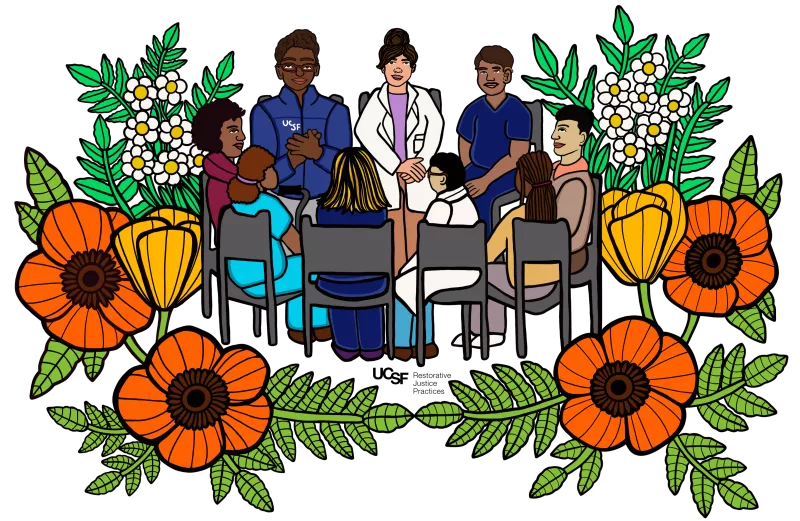Our Interconnectedness
The relational value of restorative justice is connected to the Indigenous belief that we are interconnected with one another as human beings; therefore, it is our responsibility to strive to be in right relationships. Although Indigenous peoples and worldviews are by no means homogenous, the values, knowledge, and mindset of being interconnected with one another bear resemblance (Davis, 2019). Many cultures, communities, and families have a word or phrase that describes the restorative mindset of interconnectedness. Here are some examples:
Hózhó (Navajo): Harmony in all things Pono (Hawaiian): Righteousness and balance
In Lak'ech (Mayan proverb): You are another me Ubuntu (Nguni proverb): I am because we are
Kapwa (Filipino): I am who I am connected to Whakapapa (Māori): The idea of shared genealogy
Mitákuye Oyás’iŋ (Lakota Metaphor): We are all relatives
At UCSF, we are integrating the restorative mindset into efforts focused on strengthening our community proactively by forging trust, building understanding, and creating the foundation for healthy working relationships among and between learners, colleagues, faculty, and leadership.
The goal is to create a harmonious community where harmful acts are unlikely, but when harm is done, restorative justice practices can be applied as a response to relational harm, identify the needs of both individuals and the community, and work toward healing and restoring the community.
Elements of the restorative mindset include:
• Interconnectedness – the web of relationships that connects you and me
• Reciprocity – an expression of gratitude between an exchange
• Belonging for who you are – honoring our differences by celebrating our uniqueness
• Self-reflection – incorporating different ways of knowing
• The collective wisdom is in the room – we have all the tools we need
• Accountability – acknowledgement, self-work, repair
• Restoration – conflict as an opportunity to deepen relationships; when impact and needs are addressed
Healing rather than alienating – people are more than the harm that they cause/experience; work towards healing by first understanding the needs
Reference:
Davis, F. (2019). The little book of race and restorative justice: Black lives, healing, and US social transformation. Good Books.
Restorative justice practices and UCSF's PRIDE Values
For all members of the UCSF community to work together to fulfill our mission, UCSF has adopted a set of overarching values that aligns with UCSF’s Principles of Community. The PRIDE Values are aligned with restorative justice practices (RJP) in the following ways:
Professionalism
- RJP defines accountability as taking responsibility for one's actions and taking steps to restore trust, dignity, and care.
- RJP encourages community members to work together collaboratively to find solutions.
Respect
- RJP provides opportunities to build working relationships that are based on mutual understanding.
- RJP encourages empathy and compassion for people with different points of view and different life experiences.
- RJP prescribes a framework in which people are compelled to listen more and talk less, giving everyone an equal voice.
Integrity
- RJ circles provide a space for people to express and exchange emotions honestly.
- RJP lends transparency to the process of conflict resolution.
Diversity
- RJP encourages engagement by everyone and is based on the idea that all people are interconnected.
- RJP appreciates and celebrates differences in others. It is about respecting the individuality and worth of each person.
- RJ circles provide an opportunity for people to speak and listen to one another.
Excellence
- RJP enhances professional skills by providing a useful framework for team building, collaboration, and resolving conflicts.
- RJP enables people to do their best by supporting their well-being, giving them psychological safety to express their feelings and build better relationships with colleagues and others in the community.

